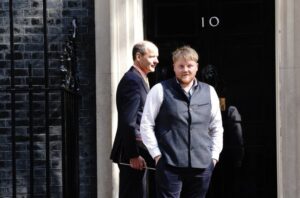No 10 food summit ‘no more than a PR stunt and full of empty gestures’ failing to tackle key issues


Rishi Sunak’s Downing Street food summit has been slammed as just full of “empty gestures and no more that an a PR stunt” by food and farming industry representatives, who rounded on the prime minister for failing to discuss soaring inflation or set out measures to safeguard British food production.
The Farm to Fork summit, the first meeting of its kind, brought together farmers, food producers and some of Britain’s largest supermarkets including farming advisor to Jeremy Clarkson Kaleb Cooper (pictured).
One representative of a trade body that attended the summit described it as an “empty meeting” with no action on price or inflation discussed. “It was there for the Tories to show they are supporting farmers,” they said.
Another attender said the summit elicited a “low-key response” from those present because it “did not touch the fundamental problems of food price inflation”.
“If you are not doing something about the cost of living, cost of production, access to labour and affordability of food then you are never going to fix the overall problem,” the attender said.
The summit had been expected to tackle topics such as food price inflation, fairness within the supply chain and helping farmers to invest in domestic production, but there was no subsequent announcement on those issues. Ministers offered no commitments in response to a call by the National Farmers’ Union (NFU) to stop Britain’s self-sufficiency in food slipping below its current level of 60%.
The summit took place against a backdrop of stubbornly high inflation, partly driven by food and drink prices, which rose 19.1% in the year to March, according to official figures.
In advance, consumer groups had called on ministers to ask grocery bosses to commit to holding down prices to help squeezed consumers, after an agreement by supermarkets in France to cap prices on key food items and a move by the French government to support food producers.
Hours before the meeting, Sunak published an open letter to farmers, promising to put UK farming at the heart of future trade deals and vowing that chlorinated chicken and hormone-fed beef would not be allowed on to the UK market.
Sunak’s pledges were welcomed by the NFU, which had repeatedly asked the prime minister to hold a food summit.
The union’s president has previously criticised the government for making farmers “a pawn in trade deals”, including those struck with Australia and New Zealand by Sunak’s predecessor, Liz Truss, during her time as international trade secretary.
Tom Bradshaw, the NFU’s deputy president, said the union believed the government had “put food security on a par with energy security” at the summit, which he called “a big step forwards”.
He added that farmers had battled to get ministers to “deliver resilience to the food supply chain”, which he hoped would help reverse recent falls in domestic production, as farmers have quit the industry amid soaring costs.
However, the government did not immediately answer the NFU’s calls to make the summit an annual event.
The meeting, which according to one person present was attended by between 60 and 70 people and lasted all morning, began with a welcome from the prime minister, before participants took part into four separate discussion groups.
Richard Griffiths, the chief executive of the British Poultry Council, who attended the summit, believed the meeting represented only “a little step forward” for the food industry.
He welcomed the government’s promises regarding future trade deals, but said “there needs to be more attention on how we and the government promote British food”.
He said promising to support producers in international trade deals without making plan on how to tackle food inflation “was like taking one corner of a big problem and trying to fix it without reference to the rest”.
Lee Stiles, the secretary of the Lea Valley Growers’ Association, a trade body for glasshouse growers, described the food summit as “no more than a PR stunt” with “nothing of substance” to help growers.
Stiles, who was not at the meeting, called on the government to take action to help with labour shortages.
He described the current seasonal agricultural workers scheme as “not fit for purpose” because it only enables holders to work for six months, although workers are needed for almost twice that period, meaning that multiple groups had to be trained each year to keep production flowing.
Stiles added: “The idea you can fill these roles with local workers is ridiculous and has been since the 1950s.”
Read more:
No 10 food summit ‘no more than a PR stunt and full of empty gestures’ failing to tackle key issues
